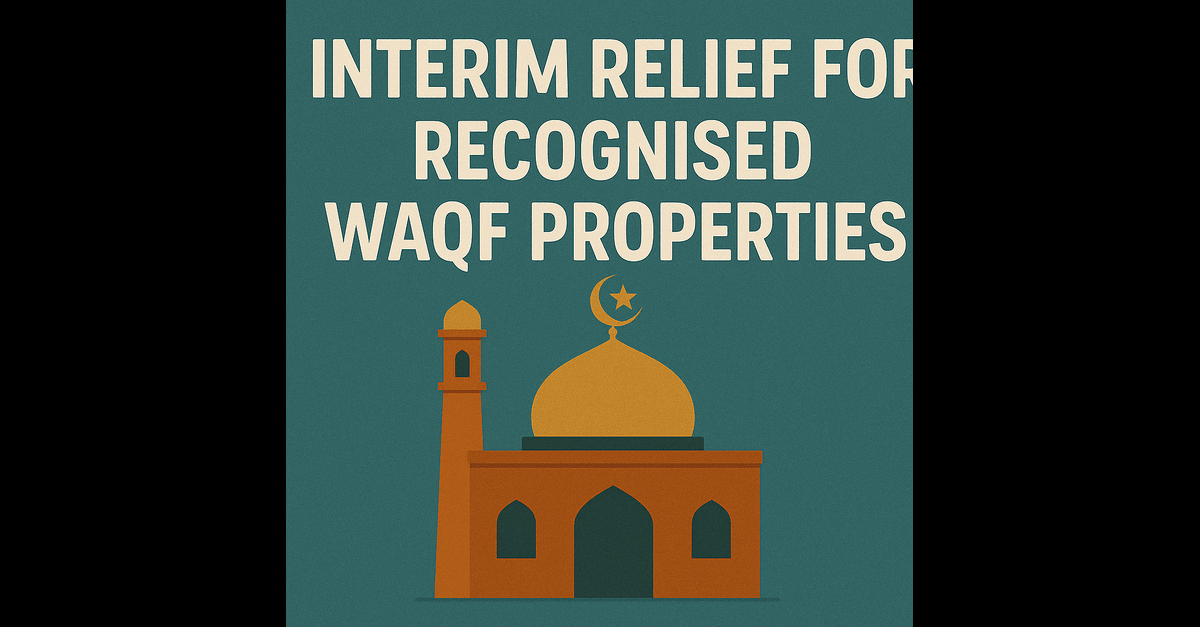INTRODUCTION
On April 17, 2025, the Supreme Court stepped in and hit pause on a fast-moving legal storm that’s been worrying a lot of people across the country. At the centre of it all is the new Waqf (Amendment) Act, 2025—and more than seventy petitions have landed on the Court’s desk, all raising a common concern: is this law going too far?
These petitions come from Muslim organisations, religious trusts, and ordinary citizens who fear that their religious endowments—some centuries old, others protected by past court rulings—are now at risk of being taken over, denotified, or controlled by those who may not even belong to the faith. The Supreme Court’s interim order doesn’t settle the matter yet, but it sends a clear signal: these concerns are serious, and the Court is listening.
BACKGROUND
The Waqf (Amendment) Act, 2025 was supposed to update how waqf properties are managed in India. But instead of reassurance, it’s caused unease.
The new law gives authorities the power to denotify waqf properties—including those recognised by courts in the past. It also opens the door for non-Muslims to be appointed to waqf boards, and gives district collectors more control over property disputes. For many, these changes feel less like reforms and more like a rollback of long-standing protections.
To understand the concern, it’s important to remember what waqf properties are: religious endowments made for the welfare of the community. These could be mosques, graveyards, schools, or land whose earnings are used for charity. Many of them carry emotional and historical value—so when the law suddenly allows the state to step in and possibly erase their protected status, it hits hard.
KEY POINTS
A bench led by Chief Justice Sanjiv Khanna, with Justices Sanjay Kumar and K.V. Viswanathan, issued an interim order making it clear that no action can be taken against waqf properties currently under dispute.
Properties that were recognised as waqf by usage or deed, especially those registered under the 1995 Waqf Act, cannot be un-notified or interfered with, unless the Court says otherwise.
The Centre, represented by the Solicitor General, promised that no new appointments will be made to waqf boards or the central waqf council while the matter is being heard.
The Court openly questioned two parts of the new law: the inclusion of non-Muslims on waqf boards, and the expanded powers of district collectors—calling them issues that raise real constitutional doubts.
Although the Court didn’t block the entire Act, it firmly said the status quo must be maintained; in other words, no changes to any disputed properties for now.
The government has one week to file its official response, and petitioners will have five more days after that to reply. The next hearing is set for May 5, 2025.
RECENT DEVELOPMENTS
This interim order is the Court’s first real action in this case—and it couldn’t have come at a more tense time. In some places, the uncertainty around waqf property status has already led to protests and even clashes. That urgency was not lost on the judges.
Chief Justice Khanna acknowledged that courts usually wait before stepping in when a new law is passed. But this case, he said, might be an exception. If properties that were once protected by courts can now be stripped of that status, it opens the door to real harm—and that’s something the Court couldn’t ignore.
The bench also didn’t hold back on its discomfort with non-Muslims being appointed to manage Muslim religious trusts. They questioned whether this would ever happen in the case of Hindu religious boards, suggesting that consistency—and sensitivity—matters in how we approach all faiths.
CONCLUSION
For now, the Supreme Court has given waqf properties a temporary shield. It hasn’t ruled on the law’s constitutionality yet—but it’s made it clear that no one can move in, denotify, or take over anything until the Court has had a full chance to hear the case.
This isn’t just about property. It’s about trust, autonomy, and the right of communities to manage their own religious spaces without undue interference. The outcome of this case could shape how India protects its religious endowments—and the communities that have built and sustained them—for generations to come.
“PRIME LEGAL is a full-service law firm that has won a National Award and has more than 20 years of experience in an array of sectors and practice areas. Prime legal falls into the category of best law firm, best lawyer, best family lawyer, best divorce lawyer, best divorce law firm, best criminal lawyer, best criminal law firm, best consumer lawyer, best civil lawyer.”
WRITTEN BY LALITHA SASANKA G


